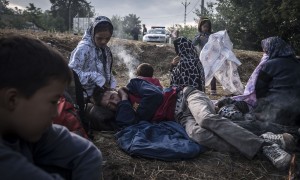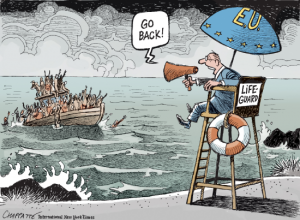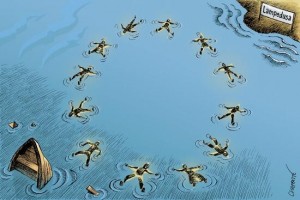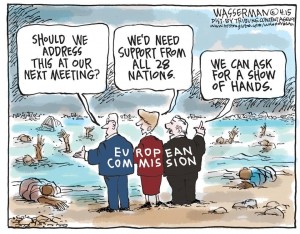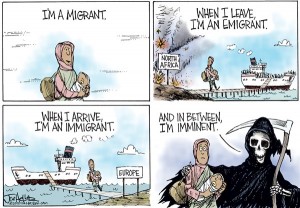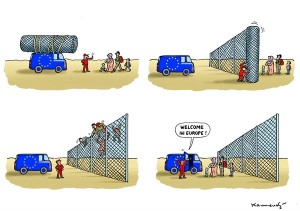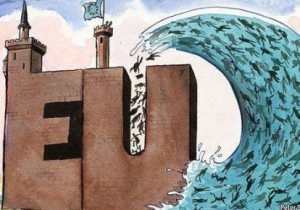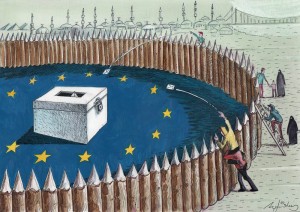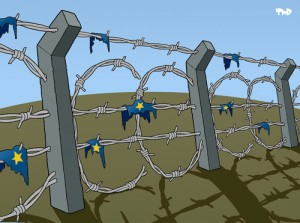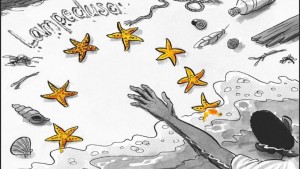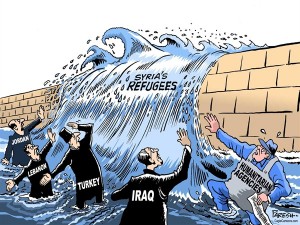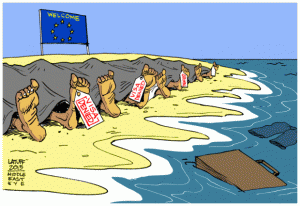KISA asks for effective measures and safe routes to face the refugee crisis
Public statements of KISA about the unprecedented refugee crisis
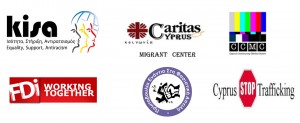 Sep 11, 2015: Joint call for event in solidarity with refugees
Sep 11, 2015: Joint call for event in solidarity with refugees
…However, the state, at least up to this moment, does not seem to agree with such solidarity with refugees. The recent statement by the Minister of Interior that at the upcoming EU Council meeting on refugees, the Republic of Cyprus is going to ask that it only accepts a limited number of refugees and that those should be only Christian Orthodox.
Within this context, we call on:
- The EU to assume its responsibilities and to direct its external policy in a way that will not contribute to the continuation of political and economic destabilisation and will support the human rights in the countries of origin of refugees.
- The EU and its Member States to make progress in effectively addressing the refugee crisis, including measures to create legal channels for the arrival of refugees in Europe, as well as adopting a common European asylum system, abandoning the policy of ‘Fortress Europe,’ which focuses solely on protecting and externalising its borders….. Read More
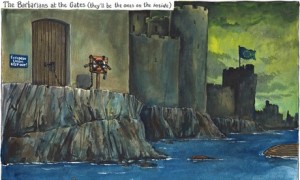 Aug 28, 2015: KISA asks for effective measures and decisive political will in order to confront the unprecedented refugee crisis.
Aug 28, 2015: KISA asks for effective measures and decisive political will in order to confront the unprecedented refugee crisis.
(Public statement of KISA in the aftermath of images of thousand refugees fled to Europe from war zones.)
” Over the last few months we are witnessing an ongoing humanitarian tragedy, the result of the unprecedented larger refugee crisis since the end of World War II, while at the same time both the Member States and the European Institutions are failing blatantly to manage the situation on the basis of the principles of the Union and of international law.
KISA considers that this refugee crisis is largely the result of the political, economic and military plans and actions developed and implemented in the countries and societies of Asia, Africa and Middle East by the powerful countries of the international community, including the European Union, for the purpose of service of their own interests. The intense humanitarian crisis that we are experiencing the last five years and especially the last months is due primarily to the economic inequalities, the fundamentalist movements and the authoritarian and antidemocratic regimes, fomented and formed by these policies”. Read More…
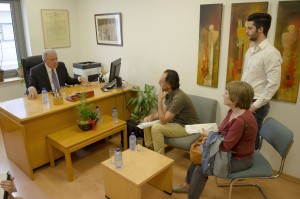 May 15, 2015: Meeting with EU Commissioner for Home Affairs A delegation of KISA had a brief meeting with the European Commissioner, Mr Avramopoulos, after his speech in the House of Representatives.
May 15, 2015: Meeting with EU Commissioner for Home Affairs A delegation of KISA had a brief meeting with the European Commissioner, Mr Avramopoulos, after his speech in the House of Representatives.
The Executive Director conveyed to Mr Avramopoulos that KISA considers as positive and towards the right direction the proposals of the European Commission (European Agenda), announced on 13/05/2015, concerning the issue of the thousands of refugees and migrants arriving in Europe through the Mediterranean Sea. KISA considers that especially positive are the measures to enhance rescue operations in the Mediterranean, improve the safe and legal mechanisms for admitting refugees from conflict zones, aim at a fairer allocation of refugees in the EU Member States and strengthening the common asylum system, including essential integration policies of refugees.
At the same time, KISA expressed its concerns regarding the emphasis that continues to be given to measures for policing of the external borders and the use of military operations, especially taking into consideration that there is a risk, as in the past, of these measures taking precedence over the aforementioned positive measures. Read More…
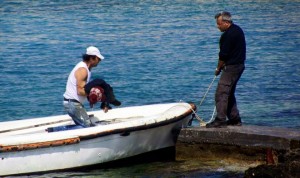 Apr 22, 2015: No more crocodile tears – Safe access of migrants and refugees to Europe (Press release concerning the thousand of refugees and migrants were drowned in the waters of the Mediterranean Sea in their attempt to seek safety and protection in the European Union.)
Apr 22, 2015: No more crocodile tears – Safe access of migrants and refugees to Europe (Press release concerning the thousand of refugees and migrants were drowned in the waters of the Mediterranean Sea in their attempt to seek safety and protection in the European Union.)
In less than ten days, about 1,400 people, among them many women and children, were drowned in the waters of the Mediterranean Sea in their attempt to seek safety and protection in the European Union.
It is more than evident that the policy of deterrence of refugees and migrants that the EU has been following in recent years has, on the one hand, transformed the Mediterranean sea into a graveyard for the desperate aspiring travelers while, on the other, the majority of the ‘lucky’ ones, those who finally manage to survive the long journey, are stack in concentration camps that the European states call reception centers, in detention centres for “prohibited” migrants or they are simply living without any real prospect or hope for their future, mainly due to the absence of essential integration policies and equal participation in society.
The European Union’s effort to prevent the entry of migrants and refugees into European territory is quite futile. As long as armed conflicts and persecutions, political instability, poverty and misery in a vast area, from Africa to Syria, Iraq and Palestine and beyond, continue and intensify, the number of migrants and refugees will be increasing since, in a desperate attempt to survive, they are forced to take the risk to cross the watery grave of the Mediterranean Sea. Read More…
WHAT WE DEMAND
 Αt European level, KISA demands from:
Αt European level, KISA demands from:
- the EU to assume its responsibilities by assisting in the restoration of the long-term political and economic stability and respect for human rights in the countries of origin of the refugees;
- the Member States to realize the importance of the current situation in order to ensure safe and unhindered access of refugees in EU countries, abandoning the policy of “Fortress Europe”;
- the EU and its Member States to demonstrate genuine solidarity and support to Member States that have a significant responsibility in receiving refugees fleeing in Europe.
 In the context of the refugee crisis, KISA demands from the Republic of Cyprus to work consistently to create a fair and efficient asylum system that will ensure:
In the context of the refugee crisis, KISA demands from the Republic of Cyprus to work consistently to create a fair and efficient asylum system that will ensure:
- the quick examination of applications;
- the ending of the political deprivation of refugee status to beneficiaries applicants that is being followed today;
- the equalization of the rights of people with subsidiary protection and recognized refugee status;
- the adoption of effective integration policies, and
- the effective measures to combat institutional racism and discrimination that lead to the social exclusion and impoverishment of refugees.
International Media on the Refugee Crisis
Selected articles January – February 2016
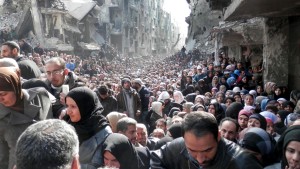 Israel’s unwanted African migrants
Israel’s unwanted African migrants
UK: High Commissioner Calls for More Funding at Support Syrians Conference
EU strikes deal on 3 billion euro migration fund for Turkey
Sweden’s anti-refugee vigilantism has revealed its dark side
15.12.15-21.12.15  Palestinian refugee pianist given Beethoven Prize Report: Refugees drown as boat sinks off Turkey My baby, the refugee: mothers on the hardest journey of their lives Afghan refugees aren’t fleeing by choice Colombian refugees seek justice in peace deal They made the world care – but where are they now? Love has no religion’: priests and pastors reach out to refugees
Palestinian refugee pianist given Beethoven Prize Report: Refugees drown as boat sinks off Turkey My baby, the refugee: mothers on the hardest journey of their lives Afghan refugees aren’t fleeing by choice Colombian refugees seek justice in peace deal They made the world care – but where are they now? Love has no religion’: priests and pastors reach out to refugees
07.12.15- 14.12.15 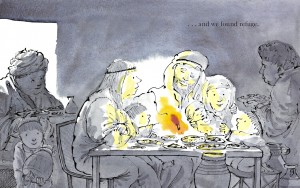 Refugees in Bulgaria: ‘Extortion, robbery, violence’ The Christmas story retold: Refuge – in pictures The refugee children making the journey to a new life, alone: ‘I expected I would die’ More than 1 million people have sought EU asylum so far in 2015 Greece buses 2,000 refugees from border camp to Athens Much ado about Muslim refugees
Refugees in Bulgaria: ‘Extortion, robbery, violence’ The Christmas story retold: Refuge – in pictures The refugee children making the journey to a new life, alone: ‘I expected I would die’ More than 1 million people have sought EU asylum so far in 2015 Greece buses 2,000 refugees from border camp to Athens Much ado about Muslim refugees
28.11.15-06.12.15 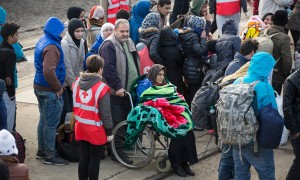 Dashed dreams on Macedonian border Life as a Red Cross worker on the refugee frontline: ‘We lived through a war too’ Unaccompanied child refugees flee Burundi Dhaka: the city where climate refugees are already a reality Lorry drivers warn of escalating violence with refugees in Calais Turkey arrests 1,300 asylum seekers after £2bn EU border control deal Life in a refugee camp: ‘the cold and fear get in your bones
Dashed dreams on Macedonian border Life as a Red Cross worker on the refugee frontline: ‘We lived through a war too’ Unaccompanied child refugees flee Burundi Dhaka: the city where climate refugees are already a reality Lorry drivers warn of escalating violence with refugees in Calais Turkey arrests 1,300 asylum seekers after £2bn EU border control deal Life in a refugee camp: ‘the cold and fear get in your bones
20.11.15-27.11.15 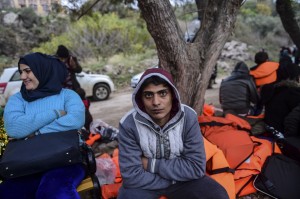 The sound and the fury: how Syria’s rappers, rockers and writers fought back Yanis Varoufakis: Europe is being broken apart by refugee crisis Refugees sew lips together in border protest Chaos on Greek islands as refugee registration system favours Syrians
The sound and the fury: how Syria’s rappers, rockers and writers fought back Yanis Varoufakis: Europe is being broken apart by refugee crisis Refugees sew lips together in border protest Chaos on Greek islands as refugee registration system favours Syrians
11.11.15 -19.11.15 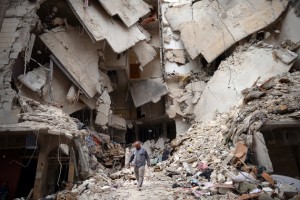 Syrian refugees in America: separating fact from fiction in the debate Calais refugees grieve for Paris while dreading Islamophobic backlash More than half the nation’s governors say Syrian refugees not welcome Look At These Photos Before You Say We Can’t Take In Syrian Refugees A perilous journey: Khalid’s flight to Europe from Syria – an illustrated account EU’s deep dilemmas over refugees laid bare at Malta summit
Syrian refugees in America: separating fact from fiction in the debate Calais refugees grieve for Paris while dreading Islamophobic backlash More than half the nation’s governors say Syrian refugees not welcome Look At These Photos Before You Say We Can’t Take In Syrian Refugees A perilous journey: Khalid’s flight to Europe from Syria – an illustrated account EU’s deep dilemmas over refugees laid bare at Malta summit
04.11.15 – 10.11.15 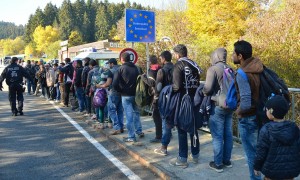 Most Syrian refugee children not in school in Turkey Confusion as Germany announces curbs on Syrian refugees Diane Abbott: economic migrants and refugees deserve equal sympathy Refugee children of Calais: ‘I’m very homesick, I wish I could go back now
Most Syrian refugee children not in school in Turkey Confusion as Germany announces curbs on Syrian refugees Diane Abbott: economic migrants and refugees deserve equal sympathy Refugee children of Calais: ‘I’m very homesick, I wish I could go back now
25.10.15 – 03.11.15 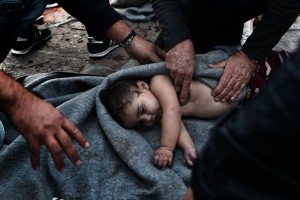 Winter is coming: the new crisis for refugees in Europe The horror of the Calais refugee camp Migrant Children, Arriving Alone and Frightened Greece Saves 240 as Boat With Migrants Capsizes Germany to apply more stringent refugee policy
Winter is coming: the new crisis for refugees in Europe The horror of the Calais refugee camp Migrant Children, Arriving Alone and Frightened Greece Saves 240 as Boat With Migrants Capsizes Germany to apply more stringent refugee policy
17.10.15 – 24.10.15 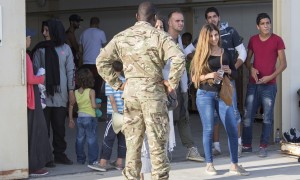 Cyprus agrees to process 114 asylum seekers who landed at British base Race against winter increases pressure on desperate Syrians to reach Greece Australia’s Migrant Rules Criticized Over Abyan, a Somali Asylum Seeker How the Church of England and the British government fell out over the ‘moral crisis’ of refugees Hungarian camerawoman fired for kicking refugees to sue man she tripped Refugees cross into Slovenia after Hungary closes border with Croatia
Cyprus agrees to process 114 asylum seekers who landed at British base Race against winter increases pressure on desperate Syrians to reach Greece Australia’s Migrant Rules Criticized Over Abyan, a Somali Asylum Seeker How the Church of England and the British government fell out over the ‘moral crisis’ of refugees Hungarian camerawoman fired for kicking refugees to sue man she tripped Refugees cross into Slovenia after Hungary closes border with Croatia
09.10.15 – 16.10.15 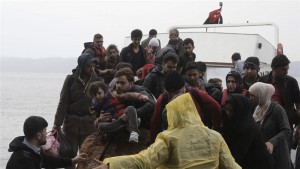 Turkey rejects EU offer on refugee crisis Five migrant stories from Greece: The pull of Europe Thousands of refugees expected to take to boats for new life as Asia’s monsoons end My British home: five refugees on living in the UK
Turkey rejects EU offer on refugee crisis Five migrant stories from Greece: The pull of Europe Thousands of refugees expected to take to boats for new life as Asia’s monsoons end My British home: five refugees on living in the UK
01.10.15 – 08.10.15 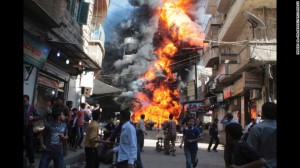 Migrant crisis: Focus turns to Turkey in EU talks Germany expects 1.5 million asylum-seekers Calais refugee camp conditions diabolical U.S. must welcome Syria’s oppressed LGBTI refugees
Migrant crisis: Focus turns to Turkey in EU talks Germany expects 1.5 million asylum-seekers Calais refugee camp conditions diabolical U.S. must welcome Syria’s oppressed LGBTI refugees
22.09.15 – 30.09.15
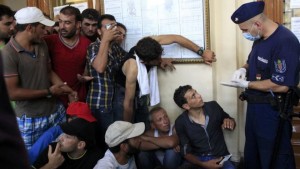 A day on a refugee rescue ship: ‘this job must be done, there must be no sinking’
A day on a refugee rescue ship: ‘this job must be done, there must be no sinking’
Migrant crisis: Memorable pictures by BBC correspondents
Nationalist Finnish protesters throw stones at bus carrying refugees
Migrant crisis: Why EU deal on refugees is difficult
14.09.15 – 21.09.15
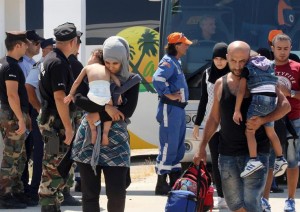 The Guardian: Thousands of refugees may lose right of asylum under EU plans
The Guardian: Thousands of refugees may lose right of asylum under EU plans
CNN: European officials hold emergency session on escalating refugee crisis
07.09.2015 – 13.09.2015
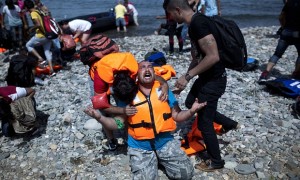 The Guardian:Refugee crisis briefing: clashes in Lesbos, ‘open arms’ in Brazil
The Guardian:Refugee crisis briefing: clashes in Lesbos, ‘open arms’ in Brazil
Fortune: Slowly, Europe’s response to refugee crisis starts to take shape
Only a global response can solve Europe’s refugee crisis
31.08.2015 – 06.09.2015
 Telegraph: Hungary: Migration crisis is Germany’s problem – not ours
Telegraph: Hungary: Migration crisis is Germany’s problem – not ours
The clobe and Mail: Europe’s greatest refugee crisis since the Second World War
BBC News: David Cameron: Taking more and more refugees not answer
The Guardian: View on Europe’s refugee crisis
The Guardian: Europe’s refugee crisis: bridges, not fences, are the answer
The Guardian: Hungary closes main Budapest station to refugees
Αljazeera: Emergency EU meeting called to tackle refugee crisis
24.08.2015 – 30.08.2015
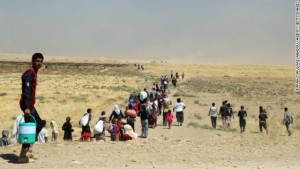 In – Cyprus: Refugee children, close to death, found in van in Austria
In – Cyprus: Refugee children, close to death, found in van in Austria
New York Times:The Global Refugee Crisis, Region by Region
The Guardian: view on Britain’s response to the Syrian refugee crisis: morally bankrupt
The New York Times: German Leaders Seek to Ease Tensions Over Migrant Crisis
Al Arabya News: The worst Middle East refugee crisis in decades
17.08.2015 – 23.08.2015
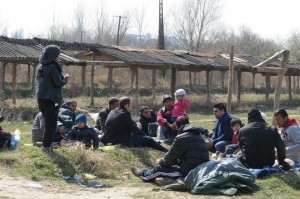 Irish Times Macedonia declares emergency on border over refugee crisis Υahoo News: Refugees break into Macedonia as migrant crisis escalates
Irish Times Macedonia declares emergency on border over refugee crisis Υahoo News: Refugees break into Macedonia as migrant crisis escalates
Reuters: With tear gas and razor wire, Macedonia tries to stem refugee tide
International and European Campaigns aiming to address refugee crisis
Who are the refugees?
The term refugee is familiar to most people. Common notions of refugees include people fleeing for their lives to escape a natural disaster or war zone. Past examples of mass refugee flows include the Balkans war, the Rwandan genocide and World War II. The concept of seeking refuge has been present in our cultures and societies for a long time.
1951 Geneva Convention
The most widely used legal definition of a refugee is contained in the 1951 Geneva Convention Relating to the Status of Refugees, which has been signed by one hundred and forty seven countries. These states recognise the right of a person to flee their country because they have a “well-founded fear of being persecuted” due to their race, religion, nationality, membership of a particular social group or political opinion.
Other definitions are found in international treaties such as the Convention Governing the Specific Aspects of Refugee Problems in Africa that has been signed by forty five countries and the Cartagena Declaration on Refugees, Colloquium on the International Protection of Refugees in Central America, Mexico and Panama signed by thirty five countries.
What all these treaties describe is the basic notion of a person forced to leave their country of origin and seek refuge in a foreign land.
Distinguishing refugees from migrants.
Refugees are by no means the only people living outside their country of origin. In today’s global village people are constantly leaving their homes in search of new opportunities. Migration across borders or within a country is a reality for many societies across the world.
In public debates the distinction between refugees and other people on the move is often blurred. It is important to remember however, that refugees have a distinct legal status. Refugees are forced to leave their country because their lives are in danger. Migrants and other groups on the move often make a conscious decision for economic and other reasons. Refugees don’t have this choice.
Refugees are forced to leave and need international protection. This is why one hundred and forty seven countries across the world have signed the Geneva Convention and granted refugees a unique legal status.
Numbers of Refugees.
The United Nations High Commissioner for Refugees (UNHCR) estimated that in 2014 there were around 14.4 million refugees under their mandate, as well as 5.1 million Palestinian refugees. This gives a combined total of approximately 19.5 million refugees globally.
Recap: refugees are…
- Persons fleeing persecution as defined in the 1951 Geneva Convention and other treaties.
- Persons that cross an international border and are given protection by a host country.
- Not migrants or other groups on the move. Refugees have a distinct legal status.
SOURCE:

